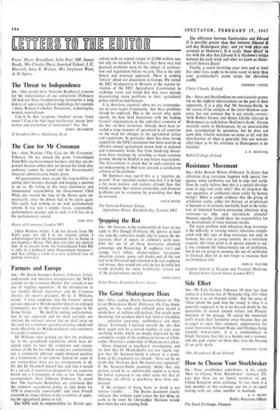Farmers and Europe SIR,—Mr David Summers (Letters, February 3) mis-
understands and therefore misrepresents the NFU's attitude on the Common Market. Our attitude is not one of 'niggling opposition.' In the introduction to our booklet British Agriculture and the Common Market, the union's president, Mr G. T. Williams, stated: 'I must emphasise that the farmers' unions are not opposed to British membership of an enlarged Community; nor do the unions seek changes in the Rome Treaty. .. . We shall be realistic and construc- tive in our approach and we shall certainly not obstruct the national interest but we shall insist on the need for a common agricultural policy which will work effectively for British producers and consumers in a wider Community.'
Mr Williams then pointed out that the problems lay in the agricultural regulations which were de- signed solely to meet the conditions and circum- stances of the Six but which would not automatically suit a completely different supply/demand position of a Community of ten nations. Indeed for some of our commodities there are no arrangements at all. On this Dr Mansholt himself has said that it would be a miracle if regulations designed for six countries would suit a Community of nine or ten. Your own correspondent, Marc Ullmann (February 3), stated that 'The Germans themselves are convinced that the common agricultural policy as laid down for 1970 is practically unworkable' and 'even French ministers no longer believe in the possibility of apply- ing the agricultural policy in full.'
The NFU with its responsibility for British agri- culture with an annual output of £2,000 million can- not rely on miracles. It believes that these very real practical problems must be the subject of examina- tion and negotiation before we join. This is the only honest and practical approach. There is nothing 'sinister' about our discussions in Europe. We visited the EEC headquarters in Brussels at the express in- vitation of the EEC Agricultural Commission to exchange views and found that they were already encountering many problems in their agricultural policy which we had forecast.
It is, therefore, essential, when we are contemplat- ing an even larger Community, that these problems should be explored. This is the reason why, quite openly, we have held discussions with the leading farmers' organisations in the individual countries of the Six—at their invitation. Already these have re- vealed a large measure of agreement in all countries on the need for changes in the agricultural policy and regulations. In particular there has been strong support for the NFU's insistence that there must be an effective annual agricultural review both at national and Community levels. Far from hindering discus- sions these meetings, by revealing so much common ground, should be helpful in any future negotiations. The Government is aware that in such contacts we are endeavouring to find ways towards a satisfactory solution of the problem.
Mr Summers may regard this as a 'negative ap- proach.' Your impartial readers may feel it is in fact a far more positive and realistic attitude than that which assumes that serious commodity and financial problems can be overcome by pretending that they do not exist.
Agriculture House, Knightsbridge, London SW!





























 Previous page
Previous page